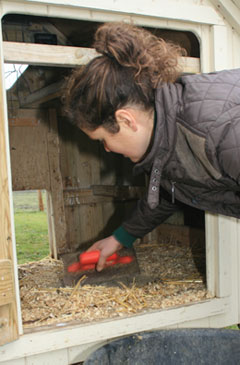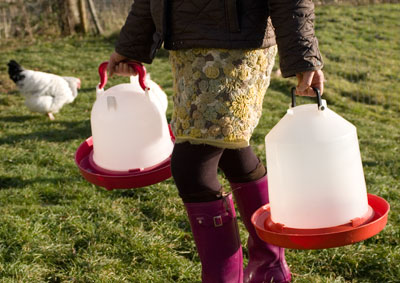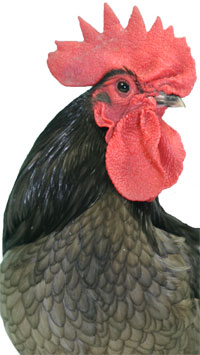Stress is a major contributor to ill health in chickens and can also make them more prone to a number of vices such as feather picking, egg eating, comb or vent pecking.
Chickens kept in intensive conditions are constantly subjected to stress which is why farmers see such high mortality rates and have to pay out to keep birds healthy and make them productive. Fortunately, keeping chickens in our back garden isn’t exactly intensive as long as they have a sufficiently large run or are let out of their run regularly to free-range although there are pleanty of other times when chickens can suffer from stress.
In short, stress is best avoided whenever possible and a little bit of care and forethought can dramatically reduce stress in your birds.
So how do we know what stresses chickens? Well, some years ago, there were studies done that measured the stress hormone ‘corticosterone’ of birds in different situations and it is this research that has enabled us to understand the stressors.
Stressors.
As well as intensive conditions causing stress, the other main stressors can seem quite trivial to us.
- Handling. This is one of the biggest stressors. Chickens are a prey species so naturally, if caught and picked up, they become stressed. Whilst regular handling is important for health checks, chasing a bird around a run for 5 minutes every time will not help. Try to catch birds in a confined area such as a house quickly and calmly. Hold the wings firmly and then transfer the bird to the holding position with your right hand underneath her, breast in the palm of your hand, fingers holding the tops of the legs. Her head should be underneath your arm so her head is looking behind you. Use your left hand to examine her.
- Introducing new chickens. Chickens are flock animals that have a pecking order. It is thought the ancestors to our chickens, the Red Jungle Fowl of South East Asia use the pecking order to assist in their survival. If every bird has her place, when it comes to feeding time, each one can have her turn and they don’t have to spend precious time arguing which may alert predators to their where-abouts. Every hen knows her place in the pecking order and by introducing new birds, the pecking order is upset. No hen knows where she stands and this will cause arguments and considerable stress for days until they have sorted themselves out into a ‘new flock’.
- Lack of food or water. This stress is completely avoidable of course but we all have those one off days when we suddenly realise that our birds have run out of water for one reason or another. A leaky water container, frozen water or just a forgetful moment!
- Extreme heat. Chickens don’t sweat. To cool down, a chicken must either take on cool water (and excrete more to lose the excess fluids and some heat) or pant which removes heat through the air they exhale. Chickens are much better equipped to deal with the cold and can keep their body temperature up by eating more and trapping air inside their feathers to insulate themselves thermally. Heat will cause chickens to become stressed.
- A new environment. This can be taking a bird to a show, getting your birds for the first time or just moving them to a different house or run. Another environmental change that is hard to avoid but causes considerable stress for your birds is when there has been a covering of snow.
- Egg laying. This is surprising since this is a natural things that chickens do but egg laying does cause stress on your hens. Giving them a peaceful, private, darkened nest box can help. Try not to disturb hens that are in the process of laying.
- Predation. Foxes or other predators visiting the garden on a regular basis are likely to cause stress. In the extreme case, after a fox attack, even though a chicken may survive the wounds inflicted by a fox (he grabs a mouth full of her feathers for example and the chicken escapes), she can still die because of the stress.

If you can minimise stress, your birds will be less prone to picking up disease which is something we would all like: happy, healthy chickens!






Hi
I got 3 ex battery hens yesterday and was told that some of them had vent gleet. I have seen that one of them has a white crust/discharge all around its bum which I guess definately has vent gleet. I have read that yoghurt is good for them but how do you feed them yoghurt? Also that I should clean the vent area. What is the best solution to use? Is it ok to use anti fungal creams such as cannisten or athletes foot creams for humans?
Thanks, Katie
Hello,
This is very uncommon. I would check with your vet if it hasn’t been diagnosed by someone with veterinary knowledge. Also, you would have to take advice from your vet on what to use. I would not use anti-fungal creams. Cleaning can be done with warm water and non-perfumed soap before you go to the vets. You can feed yohurt mixed with their food – Try the Chickenvet website where they sell Beryls friendly Bacteria.
Hello again,
My 3 hybrids are now 23 weeks old and laying well. We have a large run for them and they have access to food, water, perches inside and out, dust bath and hanging treat sticks or green veg to try and keep them amused! However, my dominant Nera has just started to feather peck the Skyline who is becoming extremely stressed (as am I!). I am not quite sure how to deal with it – any advice would be welcome. It would not be easy to separate them at this stage.
Many thanks Tarcy
I have a Black Rock who is sneezing and has runny poo. She is eating, drinking and foraging well. She has laid an egg every day except one for the last 22 days. All three hens, a Warren and a Speckledy as well, have had ACV and Verm-X in the first week and I have now started to use Flubevet to ensure that worms are not the problem. Could she just have a cold? I posted a comment a few days ago but it is not showing on the website.
Sneezing can be caused by a number of respiritory problems including a simple cold! I would keep a close eye on her and if it looks as though it’s getting any worse, take her to a vet.
I love this site, wish I had found it earlier.
I have had bantams for around 6 months now (Rose Combs). As never having before I never noticed that the cockerel had scaly leg. It is now very noticable and just about to start treatment for this as got the spray this weekend. Is it infectious for my other chickens? Also is there a set time to to cut there wing feathers as they can fly very well so they need doing (they are free range in garden) asap. aslo do I need to cut their nails as some of the birds look like they’re walking funny with their legs apart and toes twisted. i dont know how old they are as had then from a farm (kept as pets till his wife died and he got rid of them)…
Scaly leg is caused by a mite that can spread to your other chickens. I would treat them all if they are mixed.
Wings cannot be trimmed when feathers are growing (so..young birds and birds that are moulting). Look at the feather shaft and if it is growing, it will be dark and full of blood. If you cut this, it will bleed profusely.
Nails should be kept at a sensible length but trim carefully and regularly to get them back to size as there is a blood vessel inside and if you take too much off at once, it will bleed. I guesss it’s simply deformities that are causing thr birds toes to be turned inwards though if nails aren’t too big.
Hi great informative site. We are moving to a house with a large garden and want to get some hens, but we have a robust little patterdale terrier who barks at birds in the garden now or ducks in the park. Do you think even if we keep her out or try to introduce her to them so she does not bark that she will stress the chickens? I think we might resort to fencing her a good way off but would the barking worry them or would they get used to it?
Every dog is different with chickens and you would need to see how yours behaves near them. Chickens don’t usually seem that bothered by dogs or their barking although in any case, I would not leave her outside to bark but call her in or distract her if she barks. You could perhaps re-direct her onto a favourite toy for example. Learnt behaviour is harder to change but the less a dog performs that behaviour, the easier it will be.
When she is good near the chickens, that is when you want to be rewarding her with really tastey treats (ham, cheese, etc..!). Telling her off when she does something wrong will only make her fearful and break down your relationship with her and negative re-inforcement (punishment) can back-fire as at the moment the dog performs the unwanted behaviour, she can associate other things with the telling-off so she might then become fearful of the chickens for example as that was what made ‘mum’ turn funny.